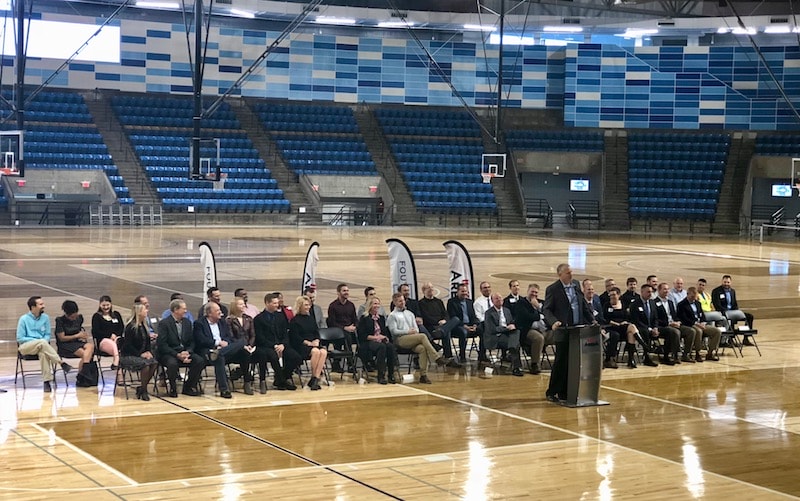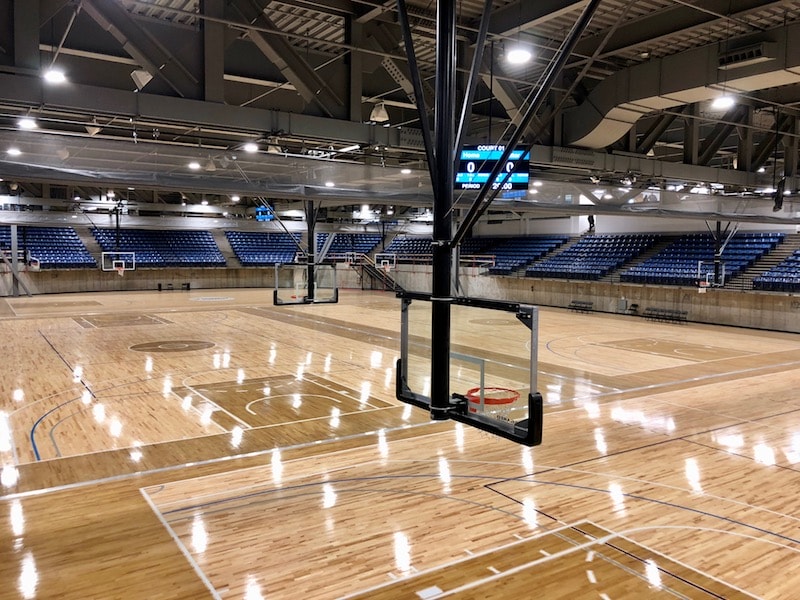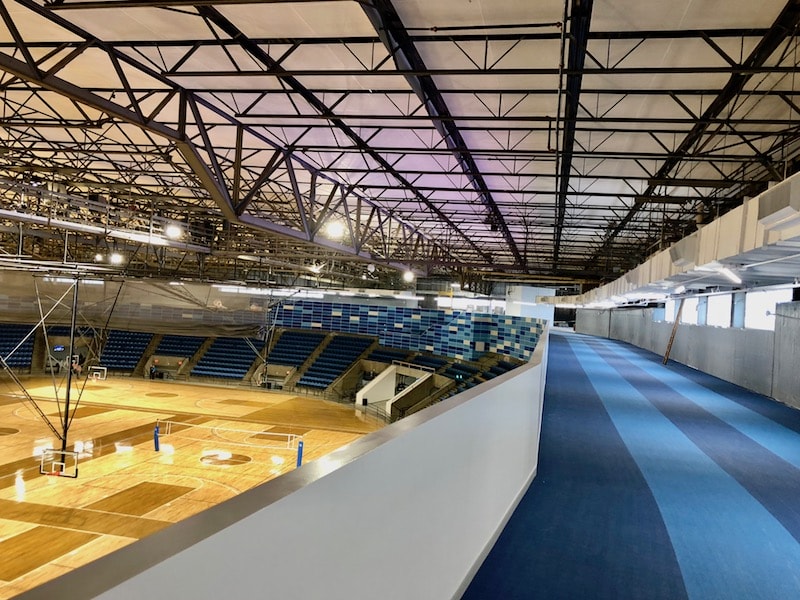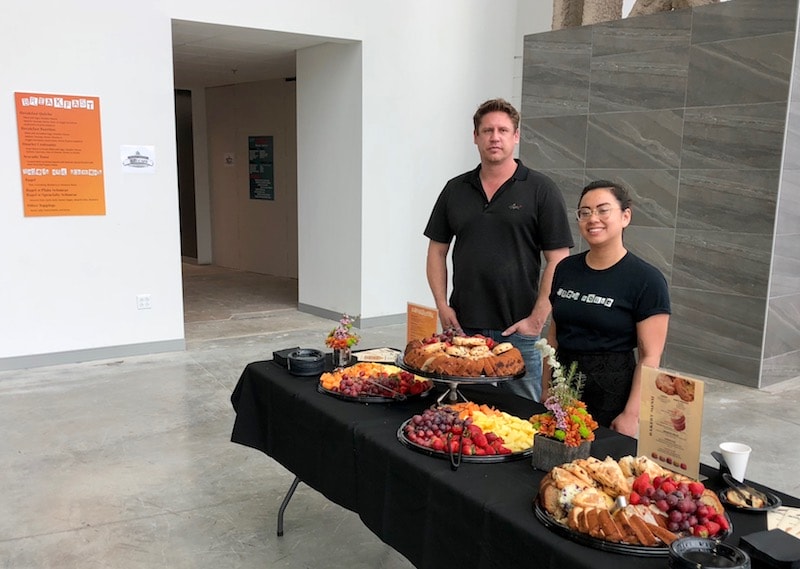Hy-Vee Arena Opens, Bringing New Bounce to Bottoms

Published October 8th, 2018 at 12:15 PM
By Kevin Collison
The Hy-Vee Arena formally opened last week in the West Bottoms at a ceremony where developer Steve Foutch was saluted for his vision and perseverance in reviving what had become a costly white elephant for the city, the former Kemper Arena.
“Six years ago, he approached us with the idea of a youth sports center,” said City Manager Troy Schulte. “You hear some crazy ideas as city manager of a large city and this one was a doozy.
“Steve encountered a lot of community resistance from some longtime stakeholders down here, but he kept persevering to see if there was a way to move forward.
“We’re standing here today thanks to his passion and vision.”

Developer Steve Foutch addresses audience at opening of Hy-Vee Arena.
The $39 million Hy-Vee redevelopment reinvented the former Kemper by dividing it in half, inserting a second floor in its middle large enough to accommodate eight basketball courts. The original floor below includes four basketball courts.
The former seating bowl was sliced in half as well, with 5,000 seats on the upper level and 3,500 on the lower. A five-lane, 350-meter track described as the largest in the continental U.S. rings the top of the arena bowl, and space for 40 retailers has been created along the outside corridors.
It’s an architectural and repurposing feat that’s being closely watched by other cities wondering what to do with older areas rendered obsolete by new ones as the Sprint Center did to Kemper.
“I’m getting calls from cities all over the world, ‘we’ve got this old arena, we don’t know what to do with it,'” Schulte said.

Steve Foutch
The challenges facing Foutch were multiple:
–Opposition from the American Royal, which wanted the city to demolish Kemper and replace it with an equestrian center.
–Convincing state and federal authorities the 45 year-old building designed by renowned architect Helmut Jahn merited National Historic Register designation to qualify for critical historic tax credits.
–Signing up enough tenants and users to make it financially viable. Foutch also had to line up Hy-Vee to purchase the naming rights to help finance the project after Mosaic Life dropped out.
–The engineering and construction challenges required to insert an entire new floor inside an existing structure.

The original floor of Kemper remains with four basketball courts, above it are the steel trusses holding the second level playing surface.
McCownGordon Construction had to drive pilings 90 feet to bedrock to support the 711 tons of structural steel bearing the new floor. Between the two levels, a total of two acres of hardwood flooring was installed.
The chief architect was Caleb Buland of Exact Architects. Elizabeth Rosin of Rosin Preservation led the effort for historic designation.
During the ceremony, the history of the former Kemper Arena was celebrated: hosting the 1976 Republican National Convention; NCAA Men’s and Women’s Tournaments; the Kansas City Kings NBA team; the Kansas City Scouts NHL club; the American Royal, and concerts too numerous to count.
“This building has an iconic history,” noted Joe Reardon, president and CEO of the Greater Kansas City Chamber of Commerce.
“With the opening of Sprint Center, there was talk of tearing Kemper down and thanks to Foutch Brothers there’s a new future for this building.”
Foutch, CEO of Foutch Brothers architecture and development, noted the building’s anticipated future as a place where youth leagues flourish along with adult groups including KC Crew and the UMKC Track and Field team, was important to him.
“If we can rebuild this arena, I think we can rebuild some lives, minds, bodies and spirits,” he said.

A 350-meter track rings the upper deck of Hy-Vee Arena.
City Councilman Scott Taylor said the project was an exceptional bargain for the city, noting it had been costing $1 million annually to maintain, and would have cost up to $12 million to demolish Kemper.
No city cash went into reviving the structure.
Now, Taylor said the facility, which backers project will draw a half-million people annually, will help further the revitalization of the entire West Bottoms area.
Across the street, the new Yards apartment project already is being built and Taylor speculated a hotel can’t be far behind to accommodate young, out-of-town athletes and their families.
An international pickle ball tournament already was held two weeks ago that drew 500 players using 36 courts.
The new Hy-Vee Arena also will be available as a downtown fitness club. A monthly individual membership for the track, courts and gym costs $65 for individuals, $95 for families and $50 for employees whose firms have a corporate rate.
A day pass to the entire facility is $15. Access to the track only for the day is $10, and if you just want to stop by a play a pick-up basketball game, it will cost $5. There is no charge to enter the arena and patronize businesses located on the outer corridor.

Opera House, a cafe that specializes in health beverages, coffee and baked goods, is a tenant. Lisa Hoang is manager, Kyle Getz is a co-owner.
Don’t miss any downtown news, sign up for our weekly CityScene KC email review here.


